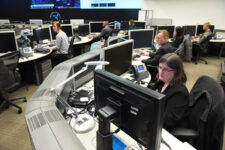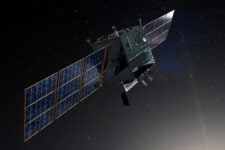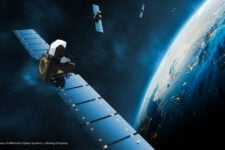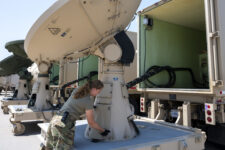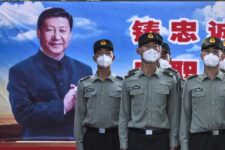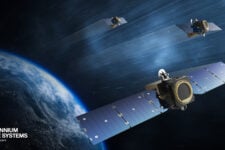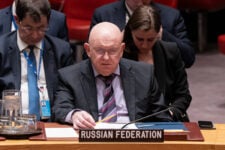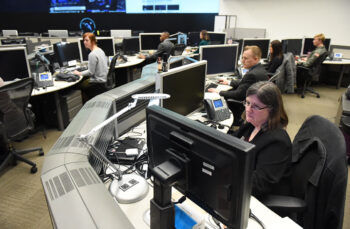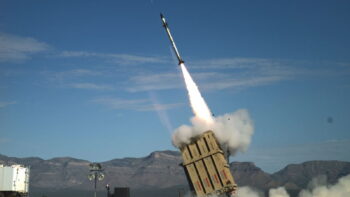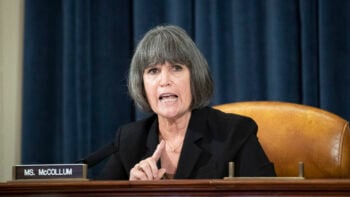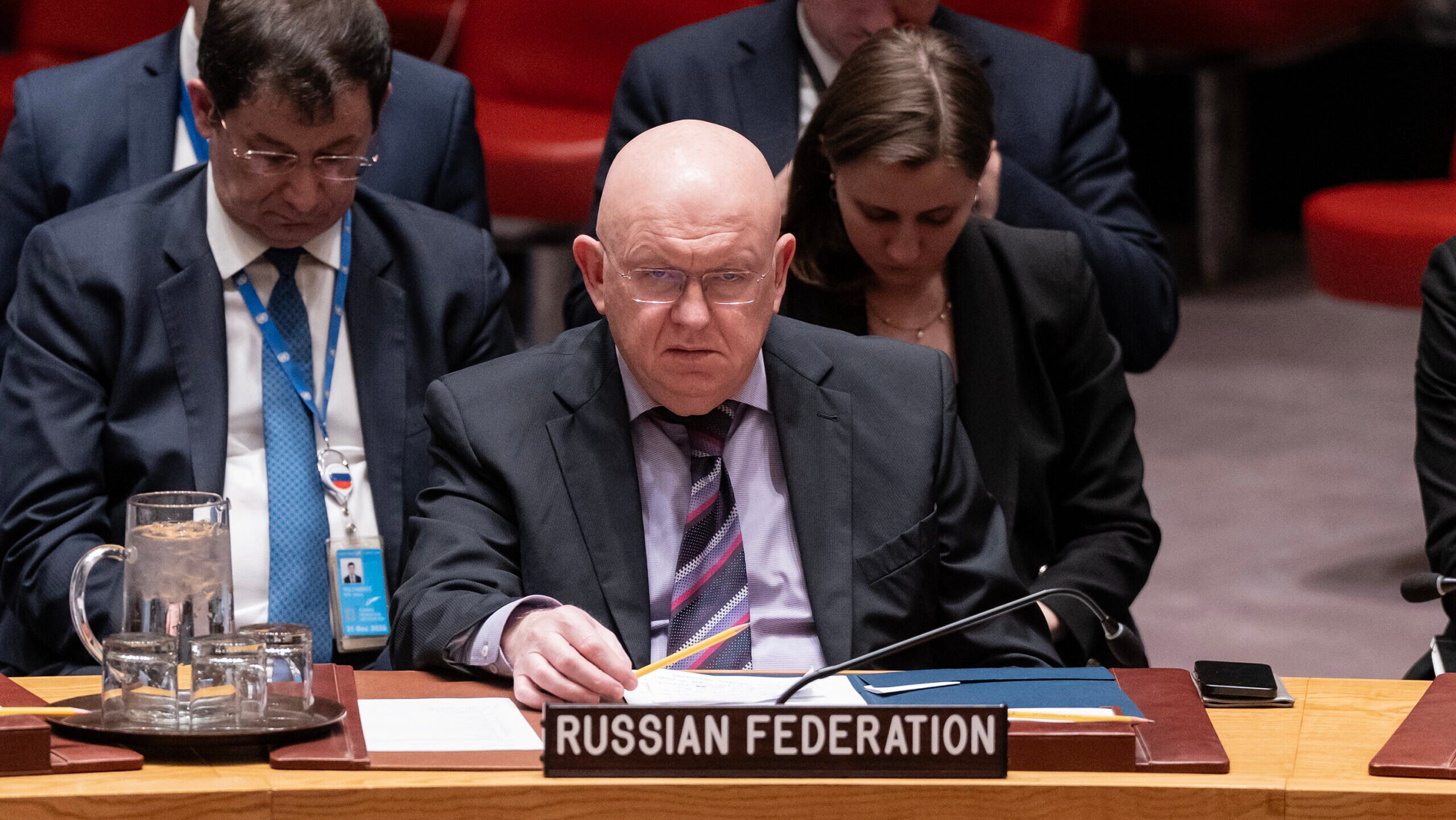
Ambassador Vassily Nebenzia of Russia attends Security Council meeting called by Russia’s request after the Iranian consulate in Syria was hit by missile. (Photo by Lev Radin/Pacific Press/LightRocket via Getty Images)
WASHINGTON — Russia’s veto on Wednesday of a UN Security Council resolution to reaffirm the 1967 Outer Space Treaty’s bar on weapons of mass destruction (WMD) in space crafted by the US and Japan highlights tautening tensions between Moscow and Washington over military space activities, including US concerns that Russia has been planning to orbit a nuclear anti-satellite (ASAT) weapon.
The US-Japan resolution marked the first time the issue of outer space security has been put before the UNSC — although debate has been ongoing for decades in other UN bodies.
“The resolution reflects an unprecedented escalation of the diplomatic standoff in the United Nations between the United States and Russia regarding arms control and security measures in outer space, which has been decades in the making,” Jessica West, of Canada’s Project Ploughshares, told Breaking Defense.
An orbiting nuclear ASAT would violate the Outer Space Treaty, signed by 115 nations including Russia. But more importantly, the potential devastation caused by a nuclear detonation in space could well destroy a large number of the world’s satellites regardless of ownership, as a Secure World Foundation fact sheet explains.
The fact that the US-spearheaded resolution was co-led by Japan, and garnered 65 co-sponsors “signals that the US is not alone in its concern for the threat” of a Russian nuke in space, nor is that concern “is not limited to NATO allies,” West noted.
“It’s almost inconceivable that any state would consider the use of nuclear weapons in orbit, not only because the prohibition of such weapons is core to the Outer Space Treaty, but also because the wide swath of destruction it would inflict, and the contamination of the environment for future generations, is mad. That it could be thought possible is an indication of just how much insecurity and instability in outer space have escalated, and diplomatic relations have deteriorated,” she added.
The US-Japan led resolution actually passed the UNSC prior to the Russian veto, with 13 in favor. Those voting for the measure included three of the five permanent UNSC members: France, the United Kingdom and the US. They were joined by rotating members Algeria, Ecuador, Guyana, Japan, Malta, Mozambique, the Republic of Korea, Sierra Leone, Slovenia and Switzerland. Russia obviously voted no; China abstained.
Several of the UNSC members supporting the US-Japan proposal, however, also voted for an amendment offered by Russia and China aimed at committing the UN to negotiating a legally binding treaty to bar the placement of any weapons in space — based on a draft treaty that they first proposed in 2008. The US and its allies consistently have opposed that draft, arguing that it is unverifiable and full of holes.
The amendment failed, with only seven members in favor: Russia and China, as well as Algeria, Ecuador, Guyana, Mozambique and Sierra Leone. The US, UK, France, Japan, Malta, South Korea, and Slovenia voted against; Switzerland abstained.
White House National Security Advisor Jake Sullivan on Wednesday issued a statement confirming the Biden administration’s belief that Russia is pursuing a nuclear ASAT, and raising questions about Moscow’s rationale for its veto.
“We have heard President [Vladimir] Putin say publicly that Russia has no intention of deploying nuclear weapons in space,” the statement read in part. “If that were the case, Russia would not have vetoed this resolution.”
Indeed, one US government official close to the UN debate told Breaking Defense that Moscow’s move actually could backfire in favor of the US — in that it gives Washington diplomatic evidence to convince other skeptical governments that its fears about Moscow’s nuclear ASAT plans are legitimate.
Russia was much less than diplomatic in criticizing the US-Japan resolution, with Ambassador Vassily Nebenzia calling it a “cynical ploy” and a “dirty spectacle” to cover Western aims to weaponize space and “tarnish” Russia as failing to uphold its treaty obligations. Putin back in February denied that Moscow had any intention of putting a nuke in space.
“Although Russia would not be expected to vote for a resolution aimed at its own conduct, its response that it is ‘against’ putting nuclear weapons in space is just vague enough to not quite be reassuring,” West said.
China’s UN ambassador, Fu Cong, meanwhile, explained in online statements Wednesday that while Beijing “agreed with the content” of the US-Japan resolution with regard to the Outer Space Treaty, the language was also “incomplete and unbalanced,” and thus his country was forced to abstain.
Fu also objected to a statement by US Ambassador Linda Thomas-Greenfield following Russia’s veto that China’s abstention “has shown it would rather defend Russia as its junior partner than safeguard the global non-proliferation regime.” He further called on the US to “stop its development and deployment of offensive weapons in outer space, change its negative attitude towards the negotiation of a legally binding instrument on arms control in outer space.”
New details emerge of Russia’s potential nuclear space weapon
“The United States has been aware of Russia’s pursuit of this sort of capability dating back years, but only recently have we been able to make a more precise assessment of their progress,” said Mallory Stewart, State Department assistant secretary for the Bureau of Arms Control, Deterrence, and Stability.

